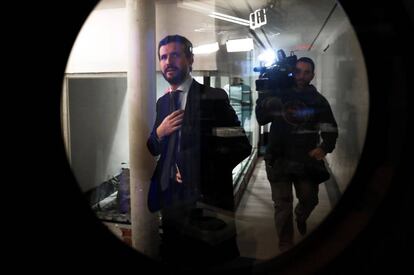In Spain, opposition vows to fight new executive every step of the way
The leader of the conservative Popular Party withdraws earlier offers of support, saying that PM Pedro Sánchez has left the country “in the hands of terrorists and coup plotters”

Spanish Prime Minister Pedro Sánchez’s confirmation in office this week may have ended eight months of a caretaker administration, but several relevant issues are likely to remain on hold due to lack of cross-party agreement.
PP leader Pablo Casado said he wants to attract “any Socialists who are feeling ashamed at Sánchez’s drift”
After earlier suggesting the possibility of cooperation on a number of issues, the new strategy of the Popular Party (PP) appears to be one of steadfast opposition to the new coalition government made up of the Socialist Party (PSOE) and the anti-austerity Unidas Podemos. The conservatives accuse the PM of having left the country “in the hands of terrorists and coup plotters” after Sánchez won the investiture bid thanks in part to abstentions from Basque and Catalan parties with separatist sympathies.
PP president Pablo Casado said on Wednesday that he wants to bring together all the moderate and centrist forces in parliament, including “any Socialists who are feeling ashamed at Sánchez’s drift.” But this new, more confrontational attitude is dividing opinion within the ranks of the PP, whose leaders are scheduled to meet next Monday to discuss the best way forward, keeping in mind the need to differentiate themselves from the far-right Vox, which surged at the November 10 election to become the third-largest force in Congress.
CGPJ and budget
High-placed PP sources have confirmed their refusal to cooperate with the Socialist Party to renew the General Council of the Judiciary (CGPJ), Spain’s legal watchdog, which has been acting in a caretaker capacity since December 2018, and which is currently dominated by a conservative majority.
Voting independence
The new coalition partners PSOE and Unidas Podemos on Wednesday signed a 20-point document pledging mutual loyalty but also underscoring each party’s freedom to vote their own way on issues that do not affect the executive’s actions.
Both parties are trying to avoid the image of a government made up of two parallel executives. On the morning show Los Desayunos de TVE, on state broadcaster TVE, Deputy PM Carmen Calvo reiterated that there is only one government and one government leader. Calvo did admit that the PSOE was displeased that Unidas Podemos had announced the names of its own ministers, even though Sánchez will not formally release the makeup of the entire Cabinet until next week.
Avoiding these sorts of situations has led to the 20-point working protocol, which emphasizes the need for internal communication.
The PP will also not be facilitating the passage of a new budget, which directly affects governability and Spain’s ability to meet EU economic targets. Sánchez’s earlier failure to secure approval for his 2019 budget blueprint led to early elections in April of last year, followed by the repeat vote of November.
Sánchez won both elections, but he fell short of a parliamentary majority and after the second vote was forced to seek endorsement for his proposed government from an assortment of smaller regional parties, including the pro-independence Catalan Republican Left (ERC). He also agreed to a joint administration with Unidas Podemos in what is Spain’s first coalition government since the days of the Second Republic in the 1930s.
Sources at the PP said that the Socialists’ governing deal “with the Communists” of Unidas Podemos will not yield “a responsible policy on the deficit, debt and spending.” The conservatives disagree with the new administration’s plans for tax hikes on higher earners and large corporations, as they believe that they will scare off investors.
PP leaders also say that the new government’s actions will be affected by Sánchez’s negotiations with the ERC, which abstained at the investiture vote in exchange for talks on the “political conflict” in the northeastern region. The PP has suggested that Sánchez has given in to the Catalan separatists, who are pushing for a legal referendum on independence. Sánchez has said that such a vote is not an option.
Withdrawing support
Before the investiture vote took place, PP president Pablo Casado had offered Sánchez assistance with the “governability” of Spain if the Socialist leader managed to get himself confirmed in office. Casado said he would support the budget plan if Sánchez agreed to enter into national pacts on a variety of issues.
But many of these offers have been withdrawn following the PSOE’s coalition deal with Podemos, as well as its negotiations to secure abstentions at the investiture vote from ERC and from EH Bildu, a far-left Basque party with roots in groups that supported the now-defunct terrorist organization ETA.
Spain will have four deputy prime ministers

Women will hold three of the four deputy prime ministerial position in the new Spanish government, according to sources from the Spanish executive. The positions will be held by the current Deputy Prime Minister Carmen Calvo, Economy Minister Nadia Calviño, Unidas Podemos leader Pablo Iglesias, who will also be responsible for Social Rights and the 2030 Agenda, and Teresa Ribera, who will be in charge of measures concerning climate change and the environment. Ribera is a leading experts in climate negotiations and has been present at almost all United Nation’s climate summits since 2001.
English version by Susana Urra.
Tu suscripción se está usando en otro dispositivo
¿Quieres añadir otro usuario a tu suscripción?
Si continúas leyendo en este dispositivo, no se podrá leer en el otro.
FlechaTu suscripción se está usando en otro dispositivo y solo puedes acceder a EL PAÍS desde un dispositivo a la vez.
Si quieres compartir tu cuenta, cambia tu suscripción a la modalidad Premium, así podrás añadir otro usuario. Cada uno accederá con su propia cuenta de email, lo que os permitirá personalizar vuestra experiencia en EL PAÍS.
¿Tienes una suscripción de empresa? Accede aquí para contratar más cuentas.
En el caso de no saber quién está usando tu cuenta, te recomendamos cambiar tu contraseña aquí.
Si decides continuar compartiendo tu cuenta, este mensaje se mostrará en tu dispositivo y en el de la otra persona que está usando tu cuenta de forma indefinida, afectando a tu experiencia de lectura. Puedes consultar aquí los términos y condiciones de la suscripción digital.








































